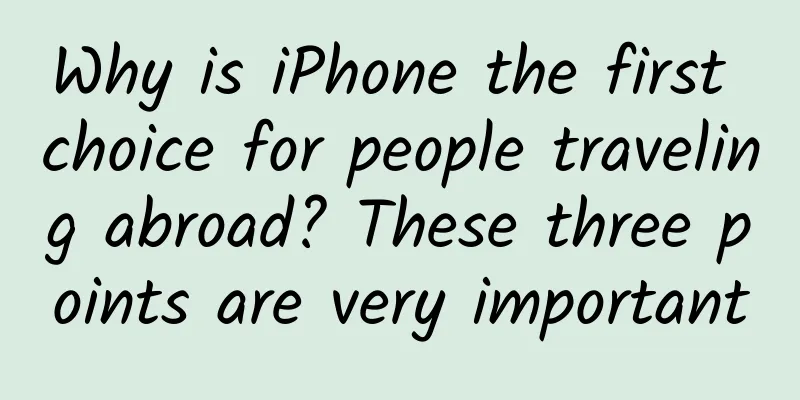Why is iPhone the first choice for people traveling abroad? These three points are very important

|
The network is the most realistic problemThe first is the very realistic hardware issue. The hardware here does not mean that domestic mobile phones are much worse than iPhones, but it is reflected in the localization and internationalization. Most domestic mobile phones adopt a localization strategy in hardware, without considering it from a more macro perspective. Of course, this may also be restricted by the user groups of domestic mobile phones. The difference in hardware is exactly why Chinese people prefer Apple phones when they go abroad. First of all, in terms of network, although most domestic mobile phones are now fully network-compatible, the full network here may only be for domestic network frequency bands, and when you go abroad, it is common for you to be unable to access the Internet due to the limitations of your own network hardware. In the 21st century, being unable to access the Internet is obviously very "fatal". As a world-renowned company, Apple naturally thought of a "profitable" approach during the product development stage, which is to make the iPhone more "universal". In terms of network, Apple has unified the models worldwide since iPhone 7 (except for the Intel and Felicia versions of the 7, 8, and X models), which means that Apple is one of the very few manufacturers that supports both domestic and foreign network frequency bands. For example, the iPhone 12 series is Apple’s first 5G mobile phone. Although it is Apple’s first, its support for 5G is much later than other brands. But even so, the iPhone 12 series is still the mobile phone that supports the most 5G frequency bands. Take the Chinese version of the iPhone 12 as an example. Apart from the more complete and comprehensive 4G network worldwide, the phone currently supports 17 5G frequency bands: n1, n2, n3, n5, n7, n8, n12, n20, n25, n28, n38, n40, n41, n66, n77, n78, and n79. Comparing it with the 5G frequency band support of Huawei Mate 40 series, it can be seen that except for the fact that both of them do not support millimeter waves, the iPhone 12 series supports more frequency bands than the Huawei Mate 40 series, and naturally the coverage of the network when traveling abroad is also wider. This is also the most important reason why most friends who travel abroad choose to use iPhone. Of course, you may ask: What if you encounter certain specific areas that need to support specific 5G frequency bands? In fact, it is very easy to solve. Just buy the local version of the iPhone 12. Since it is universally used worldwide, you can use the local version of the iPhone abroad and in China without worrying about network support. This is one of the reasons why unlocked versions of the iPhone such as the US and Japanese versions have a market in China. iPhone can meet the software needs of traveling abroadIn addition to hardware, software is also the reason why friends who go abroad prefer iPhone. Most users use mobile phones for convenience, and few people are willing to spend time on things other than mobile phones. This has become the watershed between iPhone and others. As we all know, most of the domestic mobile phones or domestic versions of mobile phones that we can buy are customized according to the usage habits of Chinese people, and the system and software are very different from those overseas. For example, you cannot find the entire Google app collection in the built-in app store. The fundamental reason is that GMS is not supported. GMS stands for Google Mobile Service, which is the driving force behind Google's development and promotion of Android and the basis for running Google programs. If you want to download and install software such as Google Maps, Gmail, and Youtube, which are essential for foreign users, you must support GMS. If you are using an Android phone, you must rely on GMS when traveling abroad, because if GMS is not supported, it means that the phone may not be able to install and run overseas applications. Currently, low-end and mid-range phones in China do not support GMS. Of course, there are some phones that support GMS, but either some of the functions are castrated, or a certain learning cost is required to unlock the restrictions, such as by flashing the international version of the firmware. Under such circumstances, many friends who go abroad naturally choose iPhone as their first choice. The reason is simple. iPhone does not require complicated operations to use foreign apps directly. Of course, if you want to experience more foreign localized software or services, you only need to apply for a foreign account to log in. Compared with the hassles of Android phones, iPhone may be more friendly to most friends who go abroad. Bonus alert functionIn addition to hardware and software, the iPhone also has some "global" advantages. For example, if you buy an iPhone anywhere in the world, you can enjoy local emergency alerts without installing any software or making special settings. For example, when the local government predicts extreme weather or natural disasters, it will issue an alert in advance through your iPhone. The principle of this alarm function is community broadcasting. Most of the Android phones currently available in China do not support or do not fully support community broadcasting. Perhaps you can achieve it by flashing the international version of the firmware and installing the APP, but most of them cannot experience the complete alarm function. For example, some Android phones will not emit a deafening alarm sound even if they support the alarm function. If you treat an emergency as if you missed a call, the consequences will be unimaginable. Of course, in addition to the alarm function, the iPhone has many other advantages in terms of global compatibility. For example, it supports global NFC payment functions, while some Android phones may only support local NFC, and if you use the payment function abroad, it may not work. Often, when friends who go abroad, especially those who go abroad for the first time, choose a mobile phone, they always consider convenience and versatility as the first criteria. The first point is definitely to "adapt to local customs" and be able to "use" the mobile phone in the local area, that is, to meet the basic needs of making calls and surfing the Internet; the second point is to be able to meet daily entertainment and work needs, that is, to be able to use mainstream foreign apps and services at will; the third point is a bonus, such as the alarm function mentioned in the article. Meeting the first and second points is a rigid demand, and meeting the third point is even better. Obviously, the iPhone can meet all of them, which is probably the reason why most friends who go abroad choose the iPhone as their first choice. |
>>: iOS is about to be upgraded, and the new features are very popular. Android users can only watch
Recommend
A must-have tool for parents to help their children! Youdao Children's Dictionary is launched in 2019
According to the "Critical Period Hypothesis...
Is human the most dangerous animal in the world? Check out the correct answer
Figure 1: The deadliest animals. Ranked by estima...
South Korea plans to put self-driving cars on the road by 2020, ahead of Japan
According to Forbes, China has already tested sel...
Himalaya FM product analysis!
Pan-entertainment has always been in the limeligh...
The Civic TYPE R special edition concept car may enter the Chinese market in the future
During the 2018 Tokyo Tuning Show, Honda official...
Lenovo Mobile's dilemma: high inventory and financial constraints
On January 18, 2016, Liu Jun, the former presiden...
All robots men want can satisfy artificial intelligence or have entered a legal blind spot
Artificial intelligence is nothing new. The term w...
The only new energy battery! S&P raises CATL's rating, all A certification!
On May 7, Standard & Poor's upgraded CATL...
To wash or not to wash? That is the question!
Editor: Guru...
How to promote App channels effectively? 3 stages!
APP channel promotion needs to go through three s...
In the real US color TV market, it is as difficult for domestic brands to be recognized as it is to create another Apple.
"Sell TVs to the United States!" has be...
Analysis of the "Fan Deng Reading" activity
The case analysis brought to you today is Fan Den...
Wuwei Li Dong "Main Line Dragon Catching" Issue 04 Stock
Training course content: Good stocks grow in good...
Advertising with high conversion rates all have these characteristics!
Five years ago, a trend emerged - traditional ent...









